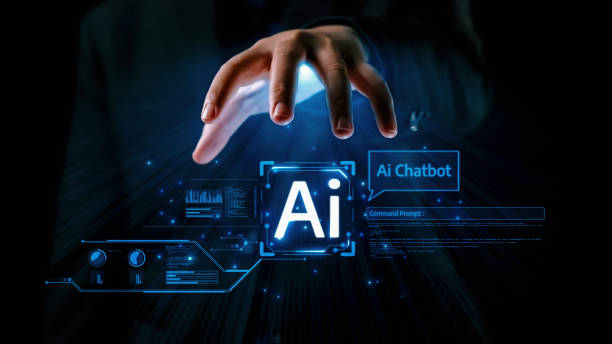What is Artificial Intelligence? Definitions and Basic Concepts

#Artificial_Intelligence (artificial intelligence) or Artificial Intelligence generally refers to the ability of a computer system to mimic human cognitive functions such as learning, reasoning, problem-solving, and perception.
This field of computer science seeks to create machines that can perform tasks that currently require human intelligence.
Artificial intelligence is a broad concept with many sub-branches.
Some of the most important of these sub-branches include Machine Learning, which allows machines to learn from data without explicit programming, Deep Learning, which uses artificial neural networks with multiple layers to analyze data, and Natural Language Processing (NLP), which allows machines to understand and generate human language.
In fact, artificial intelligence seeks to provide solutions that enable machines to interact with the real world in an intelligent way.
The main goal of artificial intelligence is to build systems that can think and make decisions like humans.
These systems are able to recognize patterns, learn from their experiences, and provide appropriate solutions in different situations.
Are you worried about the low conversion rate of your online store and not getting the sales you want?
Rasaweb is your specialized solution for having a successful online store.
✅ Significant increase in conversion rate and sales
✅ Professional and user-friendly design to satisfy customers
⚡ Are you ready for a transformation in online sales? Get free consultation!
History and Evolution of Artificial Intelligence

The history of artificial intelligence dates back to the 1950s, when researchers began exploring the possibility of building machines that could think.
The Dartmouth Conference in 1956 is often considered the official starting point of this field.
In the early decades, the main focus was on solving logical and symbolic problems.
In the 1980s and 1990s, with the development of machine learning algorithms and the increase in computer processing power, artificial intelligence experienced significant progress.
Today, with the emergence of big data and deep learning, artificial intelligence has found widespread applications in many fields, including self-driving cars, facial recognition, language translation, and medicine.
Over time, with the advancement of technology, artificial intelligence has been able to perform more complex tasks and has become one of the most important research areas.
Practical Applications of Artificial Intelligence in Various Industries

The practical applications of artificial intelligence are very broad and diverse.
In the healthcare industry, artificial intelligence is used for disease diagnosis, drug development, and treatment personalization.
In the finance industry, artificial intelligence is used for fraud detection, risk management, and providing investment advisory services.
In the manufacturing industry, artificial intelligence is used to optimize production processes, control quality, and predict equipment failure.
In the field of e-commerce, artificial intelligence is used to suggest products, answer customer questions, and analyze user behavior.
This technology is currently widely used in process automation, data analysis, improving customer experience, and making intelligent decisions.
| Industry | Application of Artificial Intelligence |
|---|---|
| Healthcare | Disease diagnosis, drug development, treatment personalization |
| Finance | Fraud detection, risk management, investment advice |
| Manufacturing | Process optimization, quality control, failure prediction |
| E-commerce | Product suggestion, answering questions, behavior analysis |
Machine Learning and Deep Learning: Differences and Similarities

Machine learning and deep learning are two important sub-branches of artificial intelligence that allow machines to learn from data.
Machine learning includes a wide range of algorithms that can extract patterns from data and make predictions.
Deep learning is a subset of machine learning that uses artificial neural networks with multiple layers to analyze data.
The main difference between machine learning and deep learning is in how features are extracted from the data.
In machine learning, engineers must manually define important features, while in deep learning, neural networks automatically learn important features from the data.
The similarity between the two methods is that they both use data to improve their performance.
Also, both methods are used in many applications, including image recognition, natural language processing, and time series prediction.
Are you tired of your company’s website not meeting your expectations? With Rasaweb, design a professional website that showcases the true face of your business.
✅ Increase the attraction of new customers and sales leads
✅ Increase the credibility and trust of your brand among the audience
⚡ Get free website design consultation!
Ethics and Responsibility in Artificial Intelligence

The development and use of artificial intelligence is associated with many ethical and accountability issues.
One of the most important of these issues is bias in the data.
If the data used to train artificial intelligence models are biased, the models will also be biased and make unfair decisions.
Another issue is the transparency and explainability of artificial intelligence models.
In many cases, the decisions that artificial intelligence models make are not explainable, and this issue can reduce public confidence in this technology.
Also, with the increasing use of artificial intelligence, the issue of job losses and changes in the labor market also arises.
Therefore, it is necessary that ethical and responsibility issues are seriously considered in the development and use of artificial intelligence, and solutions are provided to address the related challenges.
Artificial intelligence should serve humans and help improve the quality of life, not harm them.
The Future of Artificial Intelligence: Challenges and Opportunities

The future of artificial intelligence is full of challenges and opportunities.
One of the most important challenges is the development of Artificial General Intelligence (AGI), which refers to a machine that can do anything that a human can do.
Achieving AGI requires significant advances in various fields of artificial intelligence.
On the other hand, many opportunities are waiting for artificial intelligence.
Artificial intelligence can play an important role in solving complex global issues such as climate change, poverty, and disease.
Also, artificial intelligence can help improve productivity, create new job opportunities, and increase the quality of life.
Ultimately, the future of artificial intelligence depends on how we can use this technology responsibly and ethically and harness its potential to solve global challenges.
The development of artificial intelligence requires cooperation between experts, policymakers, and the general public.
Artificial Intelligence Development Tools: Platforms and Programming Languages

The development of artificial intelligence requires the use of appropriate tools, platforms, and programming languages.
TensorFlow and PyTorch are two popular platforms for developing machine learning and deep learning models.
These platforms provide extensive facilities for building, training, and deploying artificial intelligence models.
Python is one of the most popular programming languages for artificial intelligence development.
This language has powerful libraries such as NumPy, SciPy, and Scikit-learn that are used for data analysis, image processing, and machine learning.
In addition, cloud platforms such as AWS, Azure, and Google Cloud also provide extensive facilities for developing and deploying artificial intelligence applications.
| Tool | Description |
|---|---|
| TensorFlow | Popular platform for developing machine learning models |
| PyTorch | Popular platform for developing deep learning models |
| Python | Popular programming language with strong libraries |
| AWS, Azure, Google Cloud | Cloud platforms for developing and deploying artificial intelligence applications |
Security Considerations in Artificial Intelligence

Security in artificial intelligence is a critical aspect that must be considered in the development and deployment of artificial intelligence-based systems.
There are many security threats that can affect artificial intelligence systems, including Adversarial Attacks, in which input data is manipulated to cause artificial intelligence models to make incorrect decisions.
Also, the issue of data privacy is of high importance.
Artificial intelligence models are often trained using sensitive data, and it must be ensured that this data is securely stored and not made available to unauthorized persons.
In addition, the issue of misuse of artificial intelligence is also raised.
Artificial intelligence can be used for malicious purposes such as building automatic weapons or spreading misinformation.
Therefore, it is necessary that security considerations are seriously considered in the development and use of artificial intelligence, and solutions are provided to address security threats.
Are you worried that your company’s old website will drive away new customers? Rasaweb solves this problem by designing a modern and efficient company website.
✅ Increases your brand credibility.
✅ Helps to attract targeted customers.
⚡ Contact Rasaweb for a free consultation!
The Role of Governments and Policymaking in Artificial Intelligence Development

Governments play an important role in the development and regulation of artificial intelligence.
Governments can contribute to the responsible and sustainable development of this technology by investing in artificial intelligence research and development, creating ethical and legal standards, and providing the necessary training.
Government policies can have a significant impact on how artificial intelligence is developed and used.
For example, governments can enact laws that protect data privacy, prevent the misuse of artificial intelligence, and support fair competition in the artificial intelligence market.
Also, governments can work with the private sector and universities to help develop a skilled workforce in the field of artificial intelligence and ensure that everyone benefits from the benefits of this technology.
The Global Perspective of Artificial Intelligence: Competition and Cooperation Between Countries

The development of artificial intelligence is a global competition and countries are trying to be leaders in this field.
The United States, China, and the European Union are among the countries that have made significant investments in artificial intelligence.
This competition can lead to innovation and progress in artificial intelligence, but it can also create challenges.
For example, the issue of access to data and the fair distribution of the benefits of artificial intelligence can lead to international tensions.
Therefore, cooperation between countries in the field of artificial intelligence is essential.
Countries can contribute to the responsible and sustainable development of artificial intelligence by sharing knowledge and experiences, creating international standards, and cooperating in solving global issues.
Frequently Asked Questions
| Question | Answer |
|---|---|
| 1. What is Artificial Intelligence (AI)? | It is a branch of computer science that aims to create machines capable of simulating human intelligence and performing tasks that require human thinking, such as learning, problem solving, and decision making. |
| 2. What are the main types of artificial intelligence? | They can be classified into Narrow AI, which focuses on a specific task, General AI, which has comprehensive human capabilities, and Super AI, which surpasses human intelligence. |
| 3. Mention some common artificial intelligence applications in our daily lives. | Includes voice assistants (such as Siri and Alexa), recommendation systems (such as Netflix and Amazon), self-driving cars, facial recognition systems, and spam filters. |
| 4. What is the difference between Artificial Intelligence and Machine Learning? | Artificial intelligence is the broader concept of creating intelligent machines, while machine learning is a subset of artificial intelligence that focuses on enabling systems to learn from data without explicit programming. |
| 5. What is Deep Learning? | It is a subset of machine learning that uses multi-layered artificial neural networks (deep neural networks) to process data and discover complex patterns, and is used in image and speech recognition. |
| 6. What are the most prominent benefits of artificial intelligence? | Improve efficiency and productivity, automate repetitive tasks, make better decisions based on big data analysis, and develop solutions to complex problems in areas such as medicine and science. |
| 7. What are the main challenges facing the development and deployment of artificial intelligence? | Includes the need for huge amounts of high-quality data, privacy and security issues, bias in data and algorithms, and high development and maintenance costs. |
| 8. Does artificial intelligence raise ethical or social concerns? | Yes, it raises concerns about privacy, algorithmic bias, job losses due to automation, and responsibility for errors made by intelligent systems, and the need for a regulatory framework. |
| 9. How can artificial intelligence affect the future of the labor market? | It can lead to the automation of some routine tasks, but it will also create new jobs that require advanced skills in developing, operating, and maintaining artificial intelligence systems. |
| 10. What are some of the modern or promising technologies in the field of artificial intelligence? | Includes advanced Natural Language Processing (NLP) (such as large language models such as ChatGPT), Computer Vision, Robotics, and Generative AI. |
And other Rasa Web advertising agency services in the field of advertising
Smart Marketing Automation: A professional solution for analyzing customer behavior with a focus on exclusive programming.
Smart Advertising Campaign: A combination of creativity and technology to attract customers through intelligent data analysis.
Smart Direct Marketing: A combination of creativity and technology to increase site traffic by optimizing key pages.
Intelligent Customer Journey Map: A quick and efficient solution to increase site traffic by focusing on optimizing key pages.
Smart Content Strategy: A professional solution to increase sales with a focus on SEO-based content strategy.
And more than hundreds of other services in the field of internet advertising, advertising consulting, and organizational solutions
Internet Advertising | Advertising Strategy | Advertorial Report
Resources
Analytical Artificial Intelligence: An In-Depth Analysis of Artificial Intelligence
,What is Analytical Artificial Intelligence? – technologyuk.net
,The Artificial Intelligence Revolution: An Overview of the Past, Present, and Future
,Artificial Intelligence in the Future
? Rasaweb Afarin: Your partner in success in the digital world! Trust our expertise to grow and be seen in the online space. We pave the way for you to reach your goals by providing comprehensive digital marketing services including corporate website design, SEO, social media management and content production.
📍 Tehran, Mirdamad Street, next to the Central Bank, South Kazerun Alley, Ramin Alley No. 6




